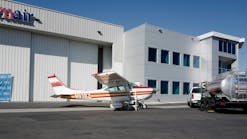In the business world, especially one like the FBO business where quality of service is often the only differentiator, there’s nothing quite like being first at something.
After being in operation less than two years, American Aero at Meacham International Airport in Fort Worth, Texas, managed one of those firsts when they became the first FBO certified under the new International Standard for Business Aircraft Handling (IS-BAH).
Adding to American Aero’s first is that the “Cowtown” FBO is actually the first in the Western Hemisphere to hang an IS-BAH certificate on their wall. An FBO in India also recently gained its IS-BAH certification.
The choice to earn IS-BAH certification seemed right in line with American Aero’s other business goals set long before the staff greeted their first airplane. American Aero, currently staffed by 21 employees, evolved from the old Atlantic Aviation facility at Meacham Airport. Atlantic’s facility was in decline when a local company, Group Holdings Inc. took an interest. Group Holdings wanted to create a flight department run by industry users, people who truly understood what pilots and their passengers want and need.
In the summer of 2012, American Aero opened its doors as a Signature Select-affiliated operation offering the benefits of the Signature Flight Support Network. By mid-April 2013, the new FBO was acquiring hangars, building hangars and helping restore the old 75,000 square-feet American Airlines’ terminal building, which dates back to 1933. American Aero eventually plans to lease approximately 8,400 square feet of that updated space. In addition to round-the-clock U.S. Customs services, American Aero also plans to build three, Leadership in Energy & Environmental Design (LEED) hangars and a two-story office complex while increasing its ramp space from two to six acres. Additional hangars slated for completion this year will accommodate aircraft as large as a G-650.
With all that on the table, obtaining the new certification made sense. “When we heard about IS-BAH, we bought into that right away,” says Bob Agostino, vice-president of American Aero and a G-650 pilot. “General Manager Riggs Brown and his team went through the IS-BAH process for a couple of reasons … to differentiate us from other FBOs, but also to validate and improve the FBO’s processes where they were needed. We knew, though, that we’d need to build a culture within the FBO that understood what the safety envelope is all about.”
IS What?
The IS-BAH label is still relatively new to most people in business aviation having been launched just shy of a year ago. The certification evaluates fixed base operators to a common, voluntary, yet measureable standard of quality and safety similar to that in place for flight departments under the International Standard for Business Aircraft Operations (IS-BAO). The new IS-BAH standard evolved from a partnership between the International Business Aviation Council and the National Air Transportation Association.
The IS-BAH certification is really an extension of the IS-BAO version with a goal of eliminating as much risk as possible for FBO clients. Agostino says his flight department has been IS-BAO Level III certified for nearly eight years because early on they saw value in formalizing operational practices and expanding the safety envelope.
The new certification demands a robust safety management system (SMS) is already up and running. American Aero General Manager Riggs Brown explains the pragmatic reason for IS-BAH. “We understand aircraft safety does not end when the engines are shut down and the aircraft is chocked.”
Considering the long list of hangar mishaps costing tens of millions of dollars in claims at FBOs worldwide, it’s actually surprising something like an IS-BAH standard took this long to emerge. “IS-BAH is the logical extension of the safety envelope that sets an international standard for operations in business and general aviation aircraft ground handling,” Brown stresses.
Mike France, NATA’s Director of Safety & Training, says the association’s move toward what would eventually become a partnership with IBAC, “began four or five years ago when our FBO members began telling us they were getting audits from customers and from airports. They said a single standard to adhere to would make their lives much easier.”
Another FBO driver, according to Bob Bauer, came directly from the clients themselves, the people who sue FBOs when aircraft are damaged being tugged around the ramp. Bauer is president of Conway New Hampshire-based Comprehensive Aviation Technical Services LLC, the company that supplied the auditors for American Aero’s certification.
“Usually it’s the larger operators who have experienced damage while parked at an FBO too,” he says. “Some FBO managers might think using a tow driver and two wing walkers consumes a lot of manpower when moving an airplane, but consider the cost of a mishap whether it’s measured in personnel or damage to an aircraft or other equipment.”
IS-BAH is expected to help policies become more consistent across the industry, even on the smaller items according to Bauer. “For instance, flight crews ask for fuel to be waiting for a quick turn and only find as they taxi in that the fuel truck is broken, or learn just before departure that their catering was mishandled or a fueler left a door open.”
Bauer thinks the internal FBO audits demanded by an IS-BAH certification will help produce a better product. “Some FBOs today still announce changes to their internal processes by pinning up a memo somewhere hoping all the employees will see it and take action. But they never really know whether everyone saw and understood what they read. IS-BAH suggests a read file that everyone signs off on, as well as regular risk assessments.”
Modify Mindsets
Agostino spoke to one of the biggest concerns for people new to any kind of quality and safety certifications … “effectively blending any new procedures and policies with the local culture of the current staff,” people who often look at safety management systems and the like as nothing more than unnecessary paperwork. He spoke of employees at any FBO who are often the most experienced who believe they “don’t need anyone telling them how to perform a job they’ve been doing for years.”
Agostino is realistic about the FBO’s new certification and extends a word of caution to all operators. “Any SMS can be defeated by an individual if that person elects not to follow the process and the procedures. While SMS is non-punitive, that doesn’t eliminate penalties for negligence or incompetency.” He adds that a comprehensive training program established long before the IS-BAH certification gave American Aero personnel a springboard to the buy in they needed to make the system work.
Almost any safety reporting system could be viewed as a hindrance at first glance. The key is to also make everyone realize an SMS is not a witchhunt to punish violators, but rather a system to identify those annoying little workplace incidents long before they become costly accidents.
Bauer reminds operators that “the lack of an accident doesn’t indicate an operation is safe either. What about close calls that are never recorded,” he asks. “The people on the ramp are sometimes the least educated about operations of anyone in the organization, but they’re the only ones actually working on the aircraft.”
Before too long, IS-BAH will become as widely an accepted standard for FBOs as IS-BAO is for flight departments, predicts Brown. “It really is a tool for the employees and the company, but also for our customers to know that we take care of their aircraft when it’s in our care,” he says. “They can worry a little less. To us it means we’ll also be going that extra mile to help our customers.”
“Nothing in our profession remains constant, certainly not the FBO business,” adds Agostino. “IS-BAH is a vehicle to help that evolution occur in a much safer way.”




